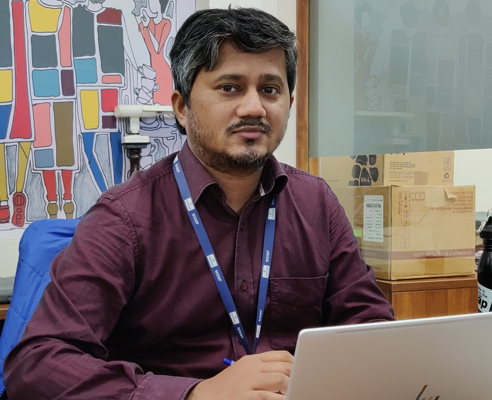
Neuro-Oncology Program
Dr. Atanu Ghorai
Research Scientist
atanu@ms-mf.org
https://scholar.google.com/citations?user=kxtGyooAAAAJ&hl=en&oi=aoResearch interests:
Molecular players regulating PMT in GBM leading to therapy resistance; Immune microenvironment in GBM; GBM heterogeneity in 3D culture system (GBM organoid); Genome instability, senescence, DNA repair, and therapy resistance; Molecular profiling of aggressive pituitary adenomas (PAs)
Publications:
1. Rajendra J*, Ghorai A*, Dutt S (2021) 14-3-3ζ negatively regulates mitochondrial biogenesisin GBM residual cells. Heliyon (Cell Press) 7(11): e08371[IF- 3.776] (* co-first author)
2. Salunkhe S, Mishra SV, Ghorai A, Hole A, Chandrani P, Dutt A, Chilakapati MK, Dutt S (2020) Metabolic rewiring in drug resistant cells exhibit higher OXPHOS and fatty acids as preferred major source to cellular energetics. BBA- Bioenergetics 1861 (12):148300 [IF-4.428]
3. Ghorai A, Mahaddalkar T, Thorat R, Dutt S (2020) Sustained inhibition of PARP-1 activity delays glioblastoma recurrence by enhancing radiation-induced senescence. Cancer Letters
490:44-53 [IF- 9.756]
4. Kaur E, Nair J, Ghorai A, Mishra SV, Achareker A, Ketkar M, Sarkar D, Salunkhe S, Rajendra J, Gardi N, Desai S, Iyer P, Thorat R, Dutt A, Moiyadi A, Dutt S (2020) Inhibition of SETMAR-H3K36me2-NHEJ repair axis in residual disease cells prevent glioblastoma recurrence. Neuro-Oncology 22 (12):1785-1796 [IF- 12.300]
5. Kaur E, Goda JS, Ghorai A, Salunkhe S, Shetty P, Moiyadi AV, Sridhar E, Mahajan A, Jalali R, Dutt S (2018) Molecular features unique to glioblastoma radiation resistant residual cells influence patient outcome. Cellular Oncology 42 (1):107-116 [IF- 6.730]
6. Ghorai A, Sarma A, Chowdhury P, Ghosh U (2016) PARP-1 depletion in combination with carbon ion exposure significantly reduces MMPs activity and overall increases TIMPs expression in cultured HeLa cells. Radiation Oncology (BMC) 11 (1):1-13 [IF- 3.481]
7. Ghorai A, Sarma A, Bhattacharyya NP, Ghosh U (2015) Carbon ion beam triggers both caspase-dependent and caspase-independent pathway of apoptosis in HeLa and expression level of PARP-1 controls overall intensity of apoptosis. Apoptosis 20 (4):562-580 [IF- 4.677]
8. Ghorai A, Bhattacharyya NP, Sarma A, Ghosh U (2014) Radiosensitivity and Induction of Apoptosis by High LET Carbon Ion Beam and Low LET Gamma Radiation: A Comparative Study. Scientifica vol. 2014, Article ID 438030, 10 pages. DOI:10.1155/2014/438030 [IF – not yet CiteScore- 3.3]
9. Ghorai A, Ghosh U (2014) miRNA gene counts in chromosomes vary widely in a species and biogenesis of miRNA largely depends on transcription or post-transcriptional processing of coding genes. Front. Genet. 5:100. DOI: 10.3389/fgene. 2014.00100 [IF – 4.599]
10. De S, Kundu R, Ghorai A, Mandal RP, Ghosh U (2014) Green synthesis of gold nanoparticles for staining human cervical cancer cells and DNA binding assay. Journal of Photochemistry and Photobiology B: Biology 140:130-139 [IF – 6.814]
11. Patra A, Sen TK, Ghorai A, Musie GT, Mandal SK, Ghosh U, Bera M (2013) Synthesis, structure, spectroscopic characterization, and protein binding affinity of new water-soluble hetero- and homometallic tetranuclear [Cu(II)2Zn(II)2] and [Cu(II)4] clusters. Inorg Chem. 52(6):2880-90 [IF – 5.165]
12. Mukherjee S, Chowdhury S, Ghorai A, Ghosh U, Stoeckli-Evans H (2013) Synthesis, structure, interaction with DNA and cytotoxicity of a luminescent copper (II) complex with a hydrazone ligand. Polyhedron 51:228-234 [IF – 2.975]
13. Ghosh K, Sarkar AR, Ghorai A, Ghosh U (2012) Design and synthesis of anthracene-based bispyridinium amides: anion binding, cell staining and DNA interaction studies. New J. Chem. 36 (5):1231-1245 [IF – 3.925]
14. Saha NC, Biswas C, Ghorai A, Ghosh U, Seth SK, Kar T (2012) Synthesis, structural characterisation and cytotoxicity of new iron (III) complexes with pyrazolyl thiosemicarbazones. Polyhedron 34 (1):1-12 [IF – 2.975]
15. Mukherjee S, Basu C, Chowdhury S, Chattopadhyay AP, Ghorai A, Ghosh U, Stoeckli-Evans H (2010) A new blue luminescent dichlorido-bridged dinuclear copper (II) complex with DNA binding and cytotoxic activities: Synthesis, structure and DFT studies. Inorganica Chimica Acta 363(12):2752-2761 [IF – 3.118]
